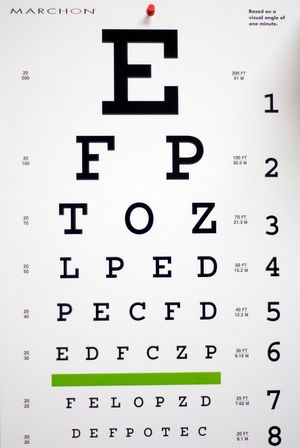
During a complete eye exam, your optometrist in Eyemart Express Florence will not only determine your prescription for eyeglasses or contact lenses, but will also check your eyes for common eye diseases, assess how your eyes work together as a team and evaluate your eyes as an indicator of your overall health.
A comprehensive eye exam includes a number of tests and procedures to examine and evaluate the health of your eyes and the quality of your vision. These tests range from simple ones, like having you read an eye chart, to complex tests, such as using a high-powered lens to examine the health of the tissues inside of your eyes.
Eye care experts recommend you have a complete eye exam with our eye doctor in Florence, SC every year to assess your risk for potentially damaging eye conditions, as well as to keep on top of any changes in vision you may be experiencing.
Book Your Annual Eye Exam With Our Florence Eye Doctor
The AOA also recommends an annual eye exam for any adult who wears eyeglasses or contacts. If you don’t normally need vision correction, you still need an eye exam every year. Doctors often recommend more frequent examinations for adults with diabetes, high blood pressure and other disorders, because many diseases can have an impact on vision and eye health.
What To Expert During Your Eye Exam in Eyemart Express in Florence
Your eye exam will start with a simple medical history and a basic vision test. Eye care experts use a variety of technologies and techniques to assess your eye health:
- Intraocular Pressure Measurement – for detecting early signs of glaucoma
- Pachymetry – it measures the thickness of the cornea and used for evaluation of corneal diseases and glaucoma.
- Slit Lamp Examination – this instrument is also called a biomicroscope. It gives your doctor a microscopic evaluation of the front part of the eye, including the lens behind the pupil, and help detect signs of infection or disease.
- Pupillary Dilation – Used by our eye care specialist for cataract, retina and vitreal evaluations,
- Visual Field Test – a very easy vision test that’s performed as a screening or baseline test for peripheral vision. Sometimes it is used in diagnosing eye diseases such as glaucoma & neurological conditions, such as strokes or brain tumors.
- Corneal Topography – used for mapping the curve of the cornea’s surface. This will help our Florence eye care specialist with contact lenses fitting, LASIK evaluations and keratoconus detection.
- Topography – used for contact lenses fitting and corneal disease evaluation.
- Retinal Tomography – a 3D scan of the most important areas of your retina for glaucoma monitoring or your macula for monitoring macular disease.
If you are over 40, it’s a good idea to have your eyes examined every one to two years to check for common age-related eye problems such as presbyopia, cataracts and macular degeneration. Read more about Vision After 40.
Because the risk of eye disease continues to increase with advancing age, everyone over the age of 60 should be examined annually. Read more about Vision After 60.
Pediatric Eye Care in Florence, SC
Some experts estimate that approximately 5% to 10% of pre-schoolers and 25% of school-aged children have vision problems. According to the American Optometric Association (AOA), all children should have their eyes examined at 6 months of age, at age 3 and again at the start of school. Children without vision problems or risk factors for eye or vision problems should then continue to have their eyes examined at every year throughout school.
Children with existing vision problems or risk factors should have their eyes examined more frequently. Common risk factors for vision problems include:
- premature birth
- developmental delays
- turned or crossed eyes
- family history of eye disease
- history of eye injury
- other physical illness or disease
The AOA recommends that children who wear eyeglasses or contact lenses should have their eyes examined at least every 12 months or according to their eye doctor’s instructions. Read more about Pediatric Eye Exams.
